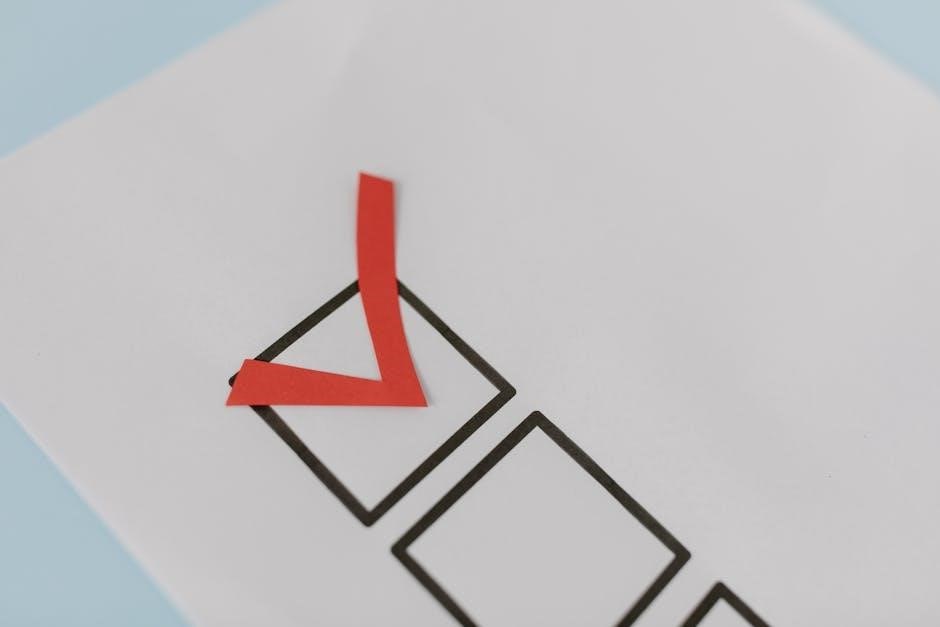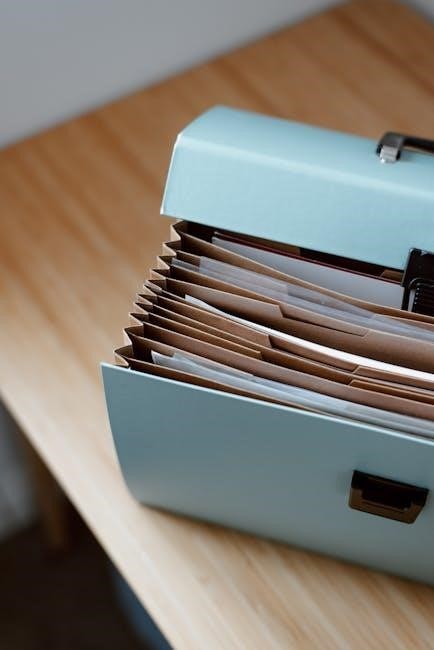An important documents checklist is a vital tool for organizing crucial paperwork, ensuring security, and maintaining easy access to personal, financial, and legal records for emergency preparedness and peace of mind.
What is an Important Documents Checklist?
An important documents checklist is a comprehensive tool designed to help individuals and families organize and keep track of crucial paperwork; It typically includes categories such as personal identification, financial records, legal documents, health information, and tax-related papers. The checklist ensures that all essential documents are accounted for, preventing loss or misplacement. It also serves as a guide for gathering and storing copies of vital records, providing easy access during emergencies or critical situations. By using a checklist, individuals can maintain order, reduce stress, and ensure their affairs are in order for themselves and their loved ones.
Why is it Essential to Have a Checklist?
A checklist for important documents is crucial for ensuring preparedness and peace of mind. It helps individuals and families organize vital records, reducing the risk of loss or misplacement. By having a structured list, you can quickly locate essential paperwork during emergencies, audits, or critical situations. It also ensures compliance with deadlines, such as tax filings, and provides a clear overview of necessary documents. This tool minimizes stress and saves time, offering a proactive approach to managing personal, financial, and legal affairs. A checklist is indispensable for maintaining order and security in both daily life and unforeseen circumstances.
Personal Identification Documents
Personal identification documents are crucial for proving identity and legal status. Essential items include driver’s licenses, passports, Social Security cards, birth certificates, marriage certificates, and divorce decrees.
Government-Issued IDs
Government-issued IDs are essential for verifying identity and legal status. Examples include driver’s licenses, passports, state ID cards, and military IDs. These documents are critical for daily transactions, travel, and accessing services. Ensuring they are valid and securely stored is vital. Replace lost or stolen IDs promptly to avoid complications. Keep digital copies in a secure location for emergencies. Organizing these documents in a checklist ensures you can quickly locate them when needed. Remember to check expiration dates and renew them in advance to maintain uninterrupted access to essential services and opportunities.
Social Security Card
A Social Security Card is a critical document issued by the government, containing a unique number assigned to U.S. citizens and eligible non-citizens. It is essential for employment, accessing benefits, and verifying identity. Keep the original in a safe place, as replacing it requires documentation and time. Store copies securely, preferably in a fireproof safe or a safety deposit box. Ensure all family members’ cards are accounted for and easily accessible in emergencies. Regularly verify the accuracy of the information and update if changes occur, such as name adjustments after marriage or divorce.
Birth Certificates
A birth certificate is a fundamental document that serves as proof of age, citizenship, and identity. It is essential for various legal and administrative purposes, such as obtaining a passport, enrolling in school, or applying for government benefits. Ensure both the original and certified copies are stored securely, with backups kept in a separate, safe location like a fireproof safe or safety deposit box. Verify the accuracy of the information and update if changes occur, such as name adjustments after adoption or marriage. Having multiple copies readily accessible is crucial for emergencies or legal matters, so keep track of where they are stored.
Marriage and Divorce Certificates
Marriage and divorce certificates are critical legal documents that provide proof of marital status, which is essential for various administrative and legal purposes. A marriage certificate is required for tasks such as updating legal names, filing joint taxes, or applying for spousal benefits. Similarly, a divorce certificate is necessary for remarriage, property disputes, or alimony arrangements. Ensure both original and certified copies are stored securely in a fireproof safe or safety deposit box. Maintain a digital backup for easy access during emergencies. Keep track of these documents, as losing them can lead to delays in legal processes. Always verify authenticity and accuracy before filing or submission.
Passport

A passport is a fundamental identity document required for international travel and verifying citizenship. Ensure your passport is valid for at least six months beyond your travel dates, as many countries enforce this rule. Store the original in a secure location, such as a fireproof safe, and keep a digital copy in a cloud storage service. Make multiple physical copies and leave one with a trusted contact for emergencies. Track the expiration date and renew it well in advance to avoid travel disruptions. Additionally, keep records of any visas or entry stamps, and report a lost or stolen passport immediately to prevent identity theft.

Financial Records
Maintaining organized financial records is crucial for managing expenses, taxes, and investments. Include bank statements, loan agreements, credit card details, and insurance policies in your checklist to ensure security and accessibility during audits or financial planning.
Bank Statements
Bank statements are essential for tracking financial transactions, verifying income, and managing expenses. Include recent statements for all accounts, such as checking and savings, to maintain a clear record of your financial activity. These documents are vital for tax preparation, audits, and proving income. Regularly updating and organizing bank statements ensures easy access during emergencies or financial planning. Store both physical and digital copies securely to prevent loss or unauthorized access. Ensure statements are legible and include account details for accurate record-keeping. This helps in maintaining financial transparency and security.
Investment Accounts
Investment accounts are critical for tracking portfolio performance and ensuring financial security. Include statements from brokerage accounts, retirement accounts like 401(k)s or IRAs, and any other investment vehicles. These documents provide detailed records of assets, transactions, and dividends, which are essential for tax filings and financial planning. Regularly update and organize these records to monitor growth and make informed decisions. Secure both physical and digital copies to protect sensitive information. Having these documents readily accessible ensures clarity in managing your investments and preparing for future financial needs or audits. They are vital for maintaining transparency and control over your financial portfolio.
Loans and Debt Agreements
Loans and debt agreements are essential documents for tracking financial obligations and ensuring compliance with repayment terms. Include copies of loan agreements, promissory notes, and payment schedules to monitor balances and interest rates. Keep records of account numbers, lender details, and payment history for mortgages, car loans, student loans, and personal debts. Also, store any correspondence with lenders, such as forbearance agreements or modification documents. These records help prevent missed payments, resolve disputes, and plan for debt repayment. Organizing these documents ensures clarity and control over your financial commitments, making it easier to manage and settle debts efficiently.
Credit Card Information
Credit card information is crucial for managing expenses and ensuring account security. Keep copies of credit card agreements, statements, and records of account numbers, expiration dates, and security codes. Store documents showing payment history, credit limits, and interest rates. Also, retain information about rewards programs and benefits. Having organized credit card records helps monitor spending, detect unauthorized charges, and resolve billing disputes. Securely store this information to prevent identity theft and maintain financial transparency. This documentation is vital for budgeting, credit score management, and ensuring timely payments to avoid late fees and penalties.
Insurance Policies
Keeping track of insurance policies is essential for financial security and emergency preparedness. Maintain copies of health, life, auto, and home insurance documents, including policy numbers, coverage details, and provider contact information. Store records of premiums, payment schedules, and policy renewal dates. Also, retain documentation of claims, deductibles, and coverage limits. Having organized insurance records ensures uninterrupted protection, facilitates claims processing, and prevents coverage lapses. Secure these documents in a safe location, such as a fireproof safe or a secure digital storage service, to guarantee accessibility during critical situations. This ensures peace of mind and financial stability when unexpected events occur.

Legal Documents
Organizing legal documents ensures rights, assets, and wishes are protected. Include wills, estate plans, power of attorney, real estate deeds, vehicle titles, and business agreements for comprehensive coverage and clarity.
Wills and Estate Planning
A will and estate plan are essential for ensuring your assets are distributed according to your wishes after your passing. Include a last will and testament, detailing asset distribution and naming an executor. Also, incorporate living trusts for probate avoidance and privacy. Advanced directives, such as living wills and healthcare proxies, outline your medical preferences. Regularly update these documents to reflect life changes. Store copies securely, like in a safe or with your attorney, and inform trusted individuals of their location. Consulting legal professionals ensures accuracy and compliance with local laws, preventing potential disputes or misunderstandings.
Power of Attorney
A Power of Attorney (POA) allows you to appoint a trusted individual to manage your financial, legal, and personal affairs if you become incapacitated. Include durable POA for ongoing authority and springing POA for activation under specific conditions. Also, consider a healthcare POA for medical decision-making. Ensure the document is witnessed and notarized to validate its legality. Store the original in a secure location, such as a safe or with your attorney, and provide copies to your designated agent and financial institutions. Regularly review and update the POA to reflect life changes or new preferences.
Real Estate Deeds
Real estate deeds are legal documents proving ownership of property and should be included in your important documents checklist. Ensure you have the original warranty deed or quitclaim deed, as they transfer property rights. The deed should include a detailed property description, grantor and grantee names, and the notary acknowledgment. Keep the original in a secure location, such as a safe or safety deposit box, and maintain a copy in your records. Update the deed if changes occur, such as adding a spouse or transferring ownership. Regularly review and ensure the document reflects current ownership status. Store securely and inform a trusted individual of its location.
Vehicle Titles
A vehicle title is a critical document proving legal ownership of a car, truck, or other motor vehicle. Include a copy of the title in your important documents checklist to ensure easy access during sales, transfers, or disputes. The title should display the vehicle’s make, model, year, and VIN, along with your name as the registered owner. If the vehicle is financed, note the lienholder’s information. Store the original title in a secure location, such as a safe or safety deposit box, to prevent loss or damage. Keep a backup copy in your files for quick reference when needed.
Business Agreements
Business agreements are essential legal documents that outline the terms, roles, and responsibilities between parties involved in a commercial relationship. These include contracts, partnership agreements, non-disclosure agreements (NDAs), and lease agreements. Keeping copies of these documents ensures clarity and protects your rights in case of disputes. Include both physical and digital backups in your checklist, storing them securely, such as in a safe or encrypted cloud storage. Regularly review and update these agreements to reflect changes in your business operations or partnerships. This ensures all parties remain aligned and legally protected.

Health and Medical Records
Health and medical records are crucial for tracking personal health history and ensuring continuity of care. Include medical history, health insurance cards, prescription lists, advanced directives, and emergency contacts. Maintain organized files for easy access during emergencies or medical consultations;
Medical History
Maintaining a detailed medical history is essential for tracking personal health and ensuring continuity of care. Include records of chronic conditions, allergies, immunizations, surgeries, and significant medical events. Keep a list of current medications, dosages, and any known drug interactions. Also, store recent test results, doctor’s notes, and treatment plans. Organized medical records help healthcare providers make informed decisions and prevent potential errors. Ensure copies are easily accessible during emergencies or when seeking new medical care. Regular updates to this documentation are crucial for accuracy and comprehensive care management.
Health Insurance
Keeping your health insurance documents organized is crucial for ensuring uninterrupted coverage and easy access to medical services. Store copies of your insurance cards, policy documents, and coverage details. Include provider networks, deductibles, copayments, and out-of-pocket maximums. Also, keep records of claims, explanations of benefits (EOBs), and any communication with your insurer. Having this information readily available helps prevent coverage gaps and resolves billing disputes efficiently. Regularly review and update your insurance records to reflect any changes in coverage or providers. This ensures you and your family remain protected and informed about your healthcare benefits.
Prescription Medications
Keeping a detailed list of prescription medications is essential for managing health and ensuring continuity of care. Include the medication name, dosage, frequency, and prescribing physician. Note any allergies or sensitivities and list alternative medications if applicable. Store copies of prescription labels or scripts for reference. Also, maintain contact information for pharmacies and healthcare providers. Having this information organized ensures clarity in emergencies and prevents potential mix-ups. Regularly update the list as medications change, and consider sharing it with trusted family members or caregivers for added safety and accessibility during critical situations.

Advanced Directives
Advanced directives are legal documents outlining your preferences for medical treatment if you become unable to communicate. They ensure your wishes are honored and reduce the burden on loved ones. Key components include a living will, which specifies end-of-life care, and a healthcare proxy, designating someone to make decisions on your behalf. Organize and store these documents securely, such as in a safety deposit box or with your attorney. Share copies with your healthcare provider and family to ensure accessibility during critical moments. Regularly review and update these directives to reflect any changes in your personal wishes or circumstances.
Emergency Contact Information
Keeping a detailed list of emergency contact information is crucial for quick communication during critical situations. Include names, phone numbers, and addresses of primary and secondary contacts, such as family members, close friends, or neighbors. Additionally, list healthcare providers, insurance representatives, and legal advisors. Organize this information in a centralized document or digital file, ensuring it is easily accessible to household members. Regularly update the list to reflect any changes in contact details or relationships. Store a backup copy in a secure location, such as a safety deposit box or cloud storage, and share it with trusted individuals to ensure prompt assistance when needed.

Tax-Related Documents
Organize income tax returns, W-2 and 1099 forms, deductions, credits, property tax records, and audit-related documents to ensure compliance and ease during tax season or audits.
Income Tax Returns
Income tax returns are essential for documenting your annual earnings and ensuring compliance with tax laws. Maintain copies of federal and state returns for at least seven years, as they may be required for audits, loans, or other financial transactions. Include supporting documents like W-2s, 1099s, and receipts for deductions. Organizing these records helps streamline tax preparation and provides a clear financial history. Securely store physical copies and consider digitizing them for easy access. Regularly updating your checklist ensures all tax-related documents are current and readily available when needed.
W-2 and 1099 Forms
W-2 and 1099 forms are critical tax documents that detail income and withholdings. W-2 forms are provided by employers, while 1099 forms are issued for freelance or contract work. These documents are essential for accurate tax filing, confirming earnings, and ensuring proper reporting of income to the IRS. Keep copies for at least seven years, as they may be needed for audits, loans, or other financial processes. Include them in your checklist and store them securely, both physically and digitally, to maintain easy access and ensure compliance with tax requirements.
Deductions and Credits
Deductions and credits are essential for reducing taxable income and minimizing tax liability. Keep records of eligible expenses, such as charitable donations, medical bills, and education costs. Supporting documents like receipts, invoices, and forms (e.g., Form 1098 for mortgage interest) are crucial for verifying claims. Credits like the Earned Income Tax Credit (EITC) or Child Tax Credit require specific documentation. Organize these records annually to ensure accuracy during tax filing. Store them securely, both physically and digitally, to maintain accessibility and comply with audit requirements. Proper documentation ensures maximum savings and avoids potential penalties.

Property Tax Records
Property tax records are vital for verifying ownership and payment history of real estate. Keep copies of tax bills, payment receipts, and assessments. These documents prove property ownership and payment status, essential for audits or disputes. Organize records by year, including any exemptions or adjustments. Store securely, both physically and digitally, to ensure accessibility. Regular updates are necessary to reflect current tax statuses and payments. Accurate records help prevent errors and provide a clear financial trail, safeguarding your property interests and ensuring compliance with tax authorities. Maintain them alongside other financial documents for comprehensive record-keeping.

Audit-Related Documents
Audit-related documents are essential for verifying financial accuracy and compliance with tax regulations. Keep detailed records of income, expenses, receipts, and bank statements. Include ledgers, invoices, and any correspondence with tax authorities. Organize documents by year and category for easy access during audits. Maintain digital backups and secure physical copies in a safe location. Regularly update records to reflect current financial statuses and ensure all transactions are accounted for. Accurate and well-organized audit-related documents help streamline the audit process, reducing errors and ensuring compliance. They are crucial for resolving disputes and demonstrating financial transparency.

Emergency Preparedness
Creating an emergency kit with backup copies of important documents ensures quick access during crises. Secure storage solutions, like waterproof containers, protect vital paperwork from damage.
Creating an Emergency Kit
Assembling an emergency kit ensures readiness for unexpected events. Include copies of vital documents, such as identification, insurance policies, and financial records, in waterproof containers. Store essentials like medications, flashlights, and communication devices. Organize items in a portable bag for easy access. Regularly update and check the kit to ensure all information is current. This preparation helps protect your family and valuables, providing peace of mind and swift recovery capabilities during crises. Remember to tailor the kit to your household’s specific needs, including pets and special requirements.
Backup Copies of Important Documents
Creating backup copies of important documents is crucial for emergency preparedness. Scan and store digital versions of identification, financial records, and legal documents in secure, encrypted cloud storage or external drives. Make physical copies and keep them in a safe, waterproof container or a separate location like a safety deposit box. Ensure backups are updated periodically to reflect changes in personal or financial circumstances. This safeguard guarantees access to critical information even if originals are lost or damaged, providing peace of mind and facilitating recovery during crises.
Secure Storage Solutions
Protecting your important documents requires reliable storage solutions. Consider using a fireproof and waterproof safe for physical copies, or rent a safety deposit box at a bank for added security. Digital storage options include encrypted cloud services like Dropbox or Google Drive, ensuring accessibility and protection. Always opt for platforms with two-factor authentication and end-to-end encryption. For sensitive files, hardware-based solutions like USB drives or external hard drives can be encrypted and stored securely. Regularly update backups and ensure trusted individuals know how to access these storage methods in case of emergencies.
